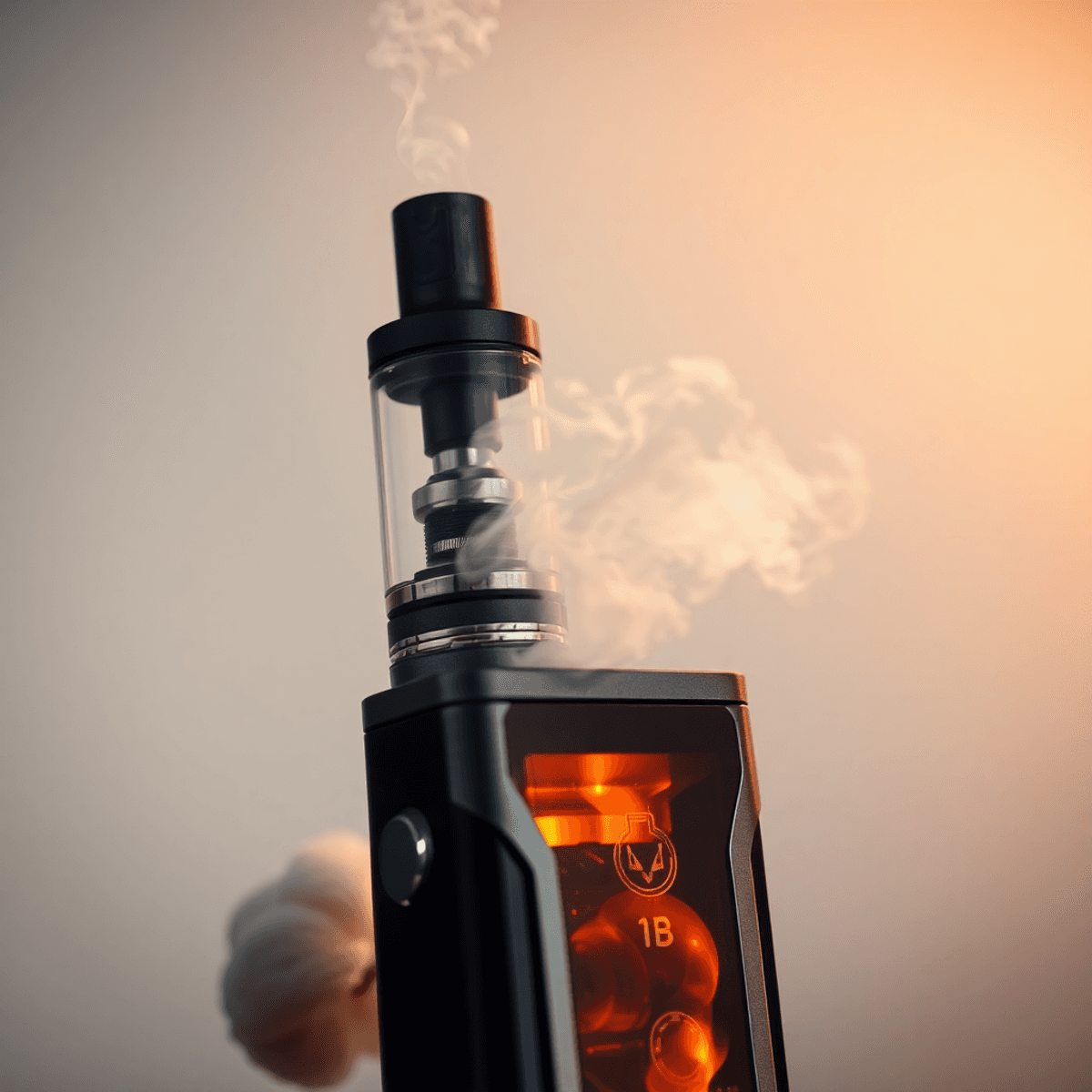Vaping has exploded in popularity across the UK, with an estimated 4.3 million people now regularly using e-cigarettes. As this trend continues to grow, questions about its health impacts – particularly on oral health – have become increasingly pressing. If you’ve ever wondered, ‘Does vaping damage teeth?’, you’ve come to the right place!
Many vapers wonder about the potential effects on their teeth and gums. It’s a valid concern, considering how vaping introduces various substances directly into the mouth. The vapour from e-cigarettes contains several components that might affect oral health:
- Nicotine
- Propylene glycol
- Vegetable glycerin
- Artificial flavourings
- Chemical additives
The relationship between vaping and dental health isn’t straightforward. While some view it as a safer alternative to traditional smoking, research suggests vaping might pose its own unique risks to teeth and gums.
Understanding these potential risks is crucial for:
- Current vapers looking to protect their oral health
- People considering vaping as an alternative to smoking
- Healthcare providers advising patients about vaping
This guide explores the scientific evidence behind vaping’s effects on dental health, helping you make informed decisions about your vaping habits and oral care routine.
Understanding Vaping and Its Components
Vape juice consists of several key ingredients that create the vapour and deliver nicotine to users. The primary components include:
- Propylene Glycol (PG) – A synthetic liquid that carries flavours
- Vegetable Glycerin (VG) – A plant-based substance creating thick vapour
- Nicotine – Optional additive in varying strengths
- Flavourings – Natural and artificial compounds
Effects of Propylene Glycol on Dental Health
When heated, propylene glycol transforms into tiny particles that can penetrate deep into oral tissues. Research indicates PG may disrupt the protective barrier of tooth enamel, making teeth more susceptible to decay. The heated PG particles can also irritate soft tissues in the mouth, potentially leading to inflammation.
Effects of Vegetable Glycerin on Dental Health
Vegetable glycerin presents its own set of challenges for dental health. This thick, sticky substance can adhere to tooth surfaces, creating an environment where harmful bacteria thrive. VG’s high viscosity means it can:
- Cling to teeth longer than other substances
- Create a breeding ground for cavity-causing bacteria
- Make it harder for saliva to naturally clean teeth
Impact of PG/VG Ratio on Oral Health
The ratio of PG to VG in vape juice varies between products, with higher VG content producing denser clouds but potentially increasing oral health risks. Some users report experiencing tooth sensitivity and gum irritation with PG-heavy formulations, while VG-dominant mixtures might contribute to plaque buildup.
The Effects of Nicotine on Oral Health
Nicotine’s impact on oral health extends far beyond surface-level concerns. This powerful chemical triggers blood vessel constriction, reducing vital blood flow to your gums. The restricted blood supply creates a dangerous environment where:
- Gum tissues receive less oxygen
- Healing processes slow down significantly
- Infection-fighting cells struggle to reach affected areas
Research shows nicotine users face a 2-6 times higher risk of developing gum disease compared to non-users. The reduced blood circulation masks early warning signs of gum problems – bleeding and inflammation might not appear until significant damage has occurred.
Nicotine also disrupts your mouth’s natural balance by:
- Altering bacterial growth patterns
- Weakening your immune system’s response
- Creating deeper gum pockets where bacteria thrive
Your gums need proper blood flow to:
- Transport essential nutrients
- Remove harmful toxins
- Support natural healing processes
- Maintain healthy tissue regeneration
Understanding these mechanisms helps explain why nicotine users often experience:
- Receding gums
- Persistent bad breath
- Loose teeth
- Delayed healing after dental procedures
Regular dental check-ups become particularly crucial for vapers using nicotine, as early detection can prevent irreversible damage to gum tissues and supporting bone structure.
Moreover, the long-term exposure to nicotine can lead to serious health complications including various forms of oral cancer, further emphasizing the importance of reducing or eliminating nicotine consumption for better oral health.
Dry Mouth and Tooth Decay in Vapers
Vaping has a significant impact on saliva production in the mouth. The heat from e-cigarettes, combined with the chemical compounds in vape juice, disrupts normal saliva flow, leading to a condition known as xerostomia – or dry mouth.
The Role of Saliva
Saliva plays a crucial role in:
- Neutralising harmful acids
- Washing away food particles
- Fighting bacteria growth
- Maintaining healthy tooth enamel
How Vaping Affects Saliva Production
When vapers experience reduced saliva production, their teeth become vulnerable to decay. The lack of natural mouth moisture creates an environment where bacteria thrive, increasing the risk of cavities and persistent bad breath.
Signs of vaping-related dry mouth include:
- Sticky, dry feeling in the mouth
- Difficulty speaking or swallowing
- Cracked lips
- Persistent thirst
Tips for Vapers to Combat Dry Mouth
To combat these effects, vapers can:
- Stay hydrated by drinking water throughout the day
- Use sugar-free gum to stimulate saliva production
- Consider alcohol-free mouth rinses
- Take regular breaks between vaping sessions
- Set reminders to sip water while vaping
The Connection Between Dry Mouth and Tooth Decay
The combination of dry mouth and repeated exposure to vape chemicals creates perfect conditions for tooth decay. Bacteria feed on any remaining sugars from flavoured e-liquids, producing acid that erodes tooth enamel and leads to cavities.
Inflammation and Damage from Vaping
Recent studies have uncovered concerning evidence about vaping’s impact on gum tissue health. Research published in the Journal of Oral Medicine reveals significant inflammation in the gum tissue of regular vapers, with signs appearing as quickly as four months after starting the habit.
Cellular Damage Beyond Irritation
The cellular damage runs deeper than surface-level irritation. Laboratory tests show vape aerosols can trigger DNA mutations in gum cells, potentially leading to:
- Weakened cell structure
- Compromised tissue repair abilities
- Increased susceptibility to bacterial infections
- Higher risk of oral cancer development
Persistent Oral Irritation Symptoms
Vapers often report persistent oral irritation symptoms:
- Tender, swollen gums
- Bleeding during brushing
- Heightened sensitivity to hot and cold
- Recurring mouth sores
The intensity of these symptoms appears linked to both vaping frequency and e-liquid composition. Higher nicotine concentrations and certain chemical additives amplify the inflammatory response. A 2022 study by the British Dental Association found that participants who vaped multiple times daily showed 60% more gum inflammation compared to occasional users.
The Inflammatory Response in Oral Tissues
These findings highlight how vaping can trigger a cascade of inflammatory responses in oral tissues. The combination of heat exposure, chemical irritants and nicotine creates an environment where gum tissue faces constant stress, potentially leading to long-term oral health complications. This is further exacerbated by the fact that chronic inflammation can significantly damage various organs, including those involved in oral health.
Impact of Flavoured E-Liquids on Teeth
Sweet-flavoured e-liquids create a perfect storm for dental problems. These liquids contain artificial sweeteners and sugary compounds that stick to tooth surfaces, creating an ideal environment for harmful bacteria to thrive.
Research from dental experts reveals concerning findings about flavoured vapes:
- Sweet and fruity e-liquids leave a sticky residue on teeth
- Bacteria feed on these sugar compounds, producing acid
- The acid attacks tooth enamel, leading to decay
- Prolonged exposure weakens teeth structure
Menthol flavours present their own risks. While they create a cooling sensation, menthol vapes can mask early warning signs of dental issues by numbing the mouth and gums. This numbness might prevent users from noticing developing cavities or gum problems until significant damage occurs.
The combination of sugary residue and repeated exposure creates a dangerous cycle:
- Sweet residue coats teeth
- Bacteria multiply rapidly
- Acid production increases
- Enamel erosion accelerates
- Cavity risk rises
Many vapers choose flavoured e-liquids to enhance their experience, unaware that these seemingly harmless additions can significantly impact dental health. The growing popularity of dessert and candy-flavoured vapes introduces concentrated sugar compounds directly onto tooth surfaces multiple times daily.
Comparing Vaping vs. Smoking for Oral Health
Both vaping and smoking pose distinct risks to oral health, yet their impacts differ significantly. Research indicates vaping causes less severe staining and bad breath compared to traditional cigarettes.
Key differences in oral health impacts:
- Smoking creates thick tar deposits on teeth, while vaping leaves minimal residue
- Cigarette smoke produces intense discolouration; vaping causes lighter staining
- Traditional smoking typically leads to more severe gum disease
The similarities between these habits centre around enamel erosion and bacterial growth. Both activities create an environment where harmful bacteria thrive, leading to:
- Weakened tooth structure
- Increased plaque formation
- Higher cavity risk
Gum inflammation levels show marked variation between smokers and vapers. Studies reveal cigarette smokers experience more severe periodontal issues, with deeper gum pockets and greater bone loss. Vapers typically display milder inflammation, though the long-term effects remain under investigation.
Heat exposure from both activities affects oral tissues, but cigarette smoke reaches higher temperatures than vapour. This temperature difference impacts tissue damage severity, with smoking causing more immediate harm to gum cells.
While vaping appears less damaging than smoking for oral health, it’s not risk-free. The question “does vaping damage teeth” has a clear answer – yes, but typically at lower levels than traditional smoking.
Recommendations for Maintaining Oral Health While Vaping
Protecting your oral health while vaping requires a proactive approach. Schedule dental check-ups every 4-6 months to catch potential issues early. Your dentist can spot signs of enamel erosion, dry mouth or gum inflammation before they become serious problems.
Essential oral care habits for vapers:
- Brush teeth twice daily with fluoride toothpaste
- Use alcohol-free mouthwash after vaping sessions
- Stay hydrated – drink water throughout the day
- Clean your tongue daily to prevent bacteria build-up
- Floss regularly to remove trapped particles
Strategies to reduce nicotine intake:
- Gradually switch to e-liquids with lower nicotine content
- Mix zero-nicotine and nicotine-containing e-liquids
- Set specific times for vaping rather than continuous use
- Consider nicotine-free alternatives for some sessions
Additional protective measures:
- Wait 30 minutes after vaping before brushing teeth
- Use sugar-free gum to stimulate saliva production
- Choose e-liquids without added sweeteners
- Consider using a vape with temperature control
Remember to pay attention to any changes in your oral health. Persistent dry mouth, bleeding gums or tooth sensitivity warrant immediate dental attention. These simple yet effective practices help minimise potential dental damage while maintaining your vaping routine.
FAQs
Does vaping damage teeth and how does it affect oral health?
Vaping can damage teeth by reducing saliva production, causing dry mouth, promoting bacterial growth and leading to enamel erosion. The harmful components in vape juice, such as propylene glycol and nicotine, contribute to gum inflammation, increased risk of gum disease and overall oral irritation.
What are the harmful effects of vape juice ingredients like propylene glycol and vegetable glycerin on teeth?
Propylene glycol (PG) when heated and inhaled can cause irritation and harm to oral tissues. Vegetable glycerin (VG) impacts tooth enamel by promoting bacterial growth that leads to decay. Both ingredients contribute to dry mouth, which increases the risk of tooth decay and bad breath among vapers.
How does nicotine in vaping products affect gum health?
Nicotine reduces blood flow to the gums, impairing their ability to fight infections. This diminished blood circulation promotes gum disease by increasing susceptibility to infections and inflammation. Understanding nicotine’s impact is crucial for managing oral health while vaping.
What is the relationship between vaping-induced dry mouth and tooth decay?
Vaping reduces saliva production leading to dry mouth, which diminishes the mouth’s natural ability to neutralize acids and wash away food particles. This environment fosters bacterial growth that increases the risk of tooth decay and bad breath. Managing dry mouth is essential for preventing dental problems in vapers.
Are flavored e-liquids harmful to teeth?
Flavored e-liquids often contain high sugar content that contributes to cavity formation. Sweetened flavors like menthol or sugary options increase the risk of enamel erosion and promote bacterial growth leading to cavities. Vapers should be cautious with flavored e-liquids due to their potential oral health risks.
How does vaping compare to smoking regarding oral health risks?
Both vaping and smoking cause enamel erosion, bacterial growth and gum inflammation that harm oral health. However, vaping may lead to different levels of gum inflammation compared to smoking. Despite some differences, both habits pose significant risks for dental problems including cavities and gum disease.




